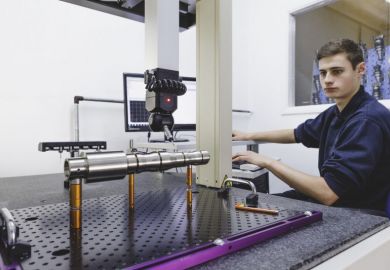One silver lining to Brexit is the UK government’s recognition that if the country is to thrive outside the European Union, it needs to address the years of neglect suffered by technical education.
In last week’s Budget, the government responded to this challenge by announcing what prime minister Theresa May called “the biggest overhaul of post-16 education in 70 years”, including a £500 million investment to create new technically focused “T levels” as an alternative to traditional A levels.
The evolving nature of the modern economy means that employers are demanding more highly educated candidates than ever before. According to the Office for National Statistics, UK productivity is stagnant, growing just 0.4 per cent in the last reported quarter, which is lower than prior to the 2008-09 downturn. In this context, I agree that we need to review our applied and technical education in order to better prepare for the workplace those failed by the current academically focused education system.
But the government’s wholesale redesign of technical education – which also includes pre-existing commitments on apprenticeships – is not necessarily the best solution. Schemes that fail to understand barriers to access or the requirements of individuals are likely to come up short.
Educational opportunities in England have never been more diverse. Choice abounds, as qualifications and institutions are constantly reformed. The 2016 Sainsbury Review of technical education, which guided the Budget announcement, called for a simplification of vocational choices, but what hasn’t been grasped is the need for more coordination and flexibility in the system. How can individuals truly choose the best educational route for them if they haven’t sampled different forms of learning?
Providers from across the sector – schools, colleges and universities – need to put aside their narrow interests and collaborate to facilitate such flexibility. At London South Bank University, we are aiming to create what I have termed a “family of educational providers”. This already includes a university technical college and an academy school, and we are currently undertaking discussions to bring in a local further education college, Lambeth College. The college focuses on technical and adult education in support of career development and progression, and would allow us to provide more collaborative links across sub-degree qualification levels.
The family concept enables cross-institutional working, helping learners to build a portfolio of skills and educational experiences. It benefits students by facilitating a flexible pathway through education, enabling them to choose the level, style and aim of learning that best suits them at the time. They are able to transfer comfortably back and forth between technical, vocational and academic pathways, based on a parity of esteem between all those routes. This will encourage the lifelong learning that everyone agrees will be crucial to preserve employability amid a rapidly evolving jobs market. We are already seeing strong increases in student attainment in both the university and schools, and we believe our collaborative approach is a driving factor in this improvement.
While this model will not be right for every university, college or school, our approach feels particularly appropriate for us, given London South Bank’s role as an anchor institution in southeast London and our experience in delivering professional and technical education. My aspiration is that our institutional family will ultimately include a further education college, several academy schools, a university technical college, specialist professional and technical educational options and even adult and special needs education. It would amount to a wide range of specialist organisations, each focusing on their strengths for the benefit of the community.
We must, of course, acknowledge the institutional costs involved in moving towards increased flexibility. Real change will not be delivered without considerable investment of time and expertise in areas such as law, management and governance. At London South Bank, it has taken us more than two years of work even to get this far.
Nonetheless, I believe the investment will be worth it. The creation of institutional groups or families of this kind can genuinely put the needs of the learner first – and thereby address the country’s skills deficit without a wholesale redesign of the education system. It is something the rest of the sector should seriously consider.
David Phoenix is vice-chancellor of London South Bank University.
POSTSCRIPT:
Print headline: Building more bridges
Register to continue
Why register?
- Registration is free and only takes a moment
- Once registered, you can read 3 articles a month
- Sign up for our newsletter
Subscribe
Or subscribe for unlimited access to:
- Unlimited access to news, views, insights & reviews
- Digital editions
- Digital access to THE’s university and college rankings analysis
Already registered or a current subscriber?







